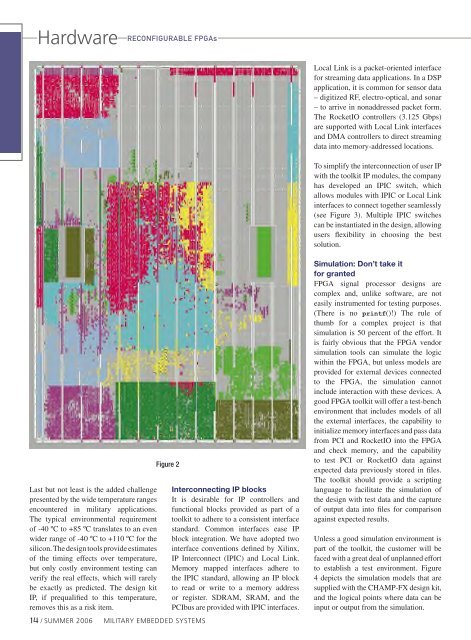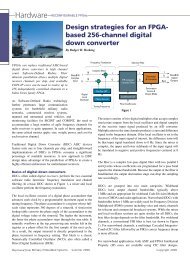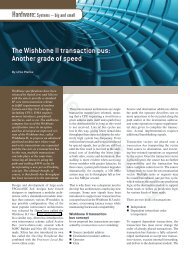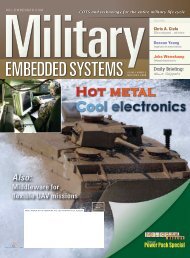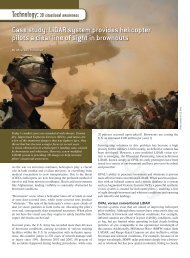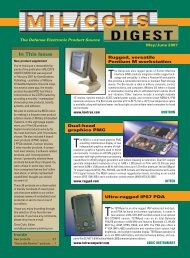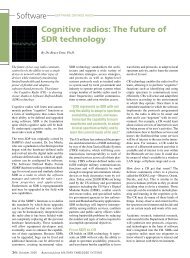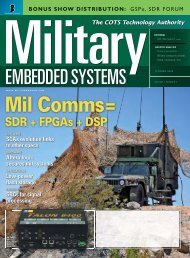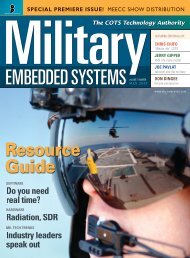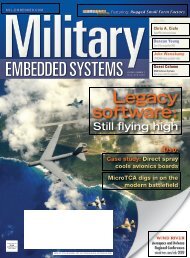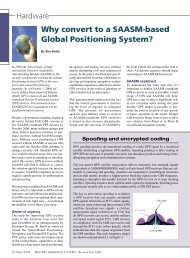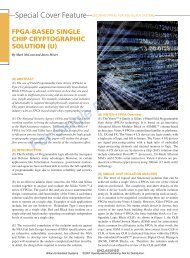Military Embedded Systems Summer 2006
Military Embedded Systems Summer 2006
Military Embedded Systems Summer 2006
Create successful ePaper yourself
Turn your PDF publications into a flip-book with our unique Google optimized e-Paper software.
Hardware<br />
Reconfigurable FPGAs<br />
Local Link is a packet-oriented interface<br />
for streaming data applications. In a DSP<br />
application, it is common for sensor data<br />
– digitized RF, electro-optical, and sonar<br />
– to arrive in nonaddressed packet form.<br />
The RocketIO controllers (3.125 Gbps)<br />
are supported with Local Link interfaces<br />
and DMA controllers to direct streaming<br />
data into memory-addressed locations.<br />
To simplify the interconnection of user IP<br />
with the toolkit IP modules, the company<br />
has developed an IPIC switch, which<br />
allows modules with IPIC or Local Link<br />
interfaces to connect together seamlessly<br />
(see Figure 3). Multiple IPIC switches<br />
can be instantiated in the design, allowing<br />
users flexibility in choosing the best<br />
solution.<br />
Last but not least is the added challenge<br />
presented by the wide temperature ranges<br />
encountered in military applications.<br />
The typical environmental requirement<br />
of -40 ºC to +85 ºC translates to an even<br />
wider range of -40 ºC to +110 ºC for the<br />
silicon. The design tools provide estimates<br />
of the timing effects over temperature,<br />
but only costly environment testing can<br />
verify the real effects, which will rarely<br />
be exactly as predicted. The design kit<br />
IP, if prequalified to this temperature,<br />
removes this as a risk item.<br />
Figure 2<br />
14 / SUMMER <strong>2006</strong> <strong>Military</strong> EMBEDDED SYSTEMS<br />
Interconnecting IP blocks<br />
It is desirable for IP controllers and<br />
functional blocks provided as part of a<br />
toolkit to adhere to a consistent interface<br />
standard. Common interfaces ease IP<br />
block integration. We have adopted two<br />
interface conventions defined by Xilinx,<br />
IP Interconnect (IPIC) and Local Link.<br />
Memory mapped interfaces adhere to<br />
the IPIC standard, allowing an IP block<br />
to read or write to a memory address<br />
or register. SDRAM, SRAM, and the<br />
PCIbus are provided with IPIC interfaces.<br />
Simulation: Don’t take it<br />
for granted<br />
FPGA signal processor designs are<br />
complex and, unlike software, are not<br />
easily instrumented for testing purposes.<br />
(There is no printf()!) The rule of<br />
thumb for a complex project is that<br />
simulation is 50 percent of the effort. It<br />
is fairly obvious that the FPGA vendor<br />
simulation tools can simulate the logic<br />
within the FPGA, but unless models are<br />
provided for external devices connected<br />
to the FPGA, the simulation cannot<br />
include interaction with these devices. A<br />
good FPGA toolkit will offer a test-bench<br />
environment that includes models of all<br />
the external interfaces, the capability to<br />
initialize memory interfaces and pass data<br />
from PCI and RocketIO into the FPGA<br />
and check memory, and the capability<br />
to test PCI or RocketIO data against<br />
expected data previously stored in files.<br />
The toolkit should provide a scripting<br />
language to facilitate the simulation of<br />
the design with test data and the capture<br />
of output data into files for comparison<br />
against expected results.<br />
Unless a good simulation environment is<br />
part of the toolkit, the customer will be<br />
faced with a great deal of unplanned effort<br />
to establish a test environment. Figure<br />
4 depicts the simulation models that are<br />
supplied with the CHAMP-FX design kit,<br />
and the logical points where data can be<br />
input or output from the simulation.


